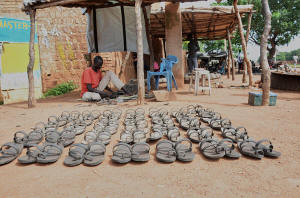As the going gets tough in South Sudan, some artisans offer cheap
footwear made from rubber tires
[July 19, 2025] By
MICHAEL ATIT
WAU, South Sudan (AP) — From Rwanda to Kenya, fashioning footwear from
discarded tires has long been a mark of local ingenuity.
In South Sudan, however, the creative work of such artisans is now
fueled by an economic crisis that has left the government on the verge
of bankruptcy and many people struggling to put food on the table.
As South Sudan’s oil revenues have dwindled, the government for months
has been unable to pay civil servants on time. The cash crisis affects
everyone from soldiers to teachers, underscoring the range of economic
hardship across the country, and many are looking for ways to keep
going.
Some want cheap shoes, finding them not in supermarkets but in open
markets where flip-flops and sandals are fashioned from worn-out tires
usually thrown away as rubbish.
Demand rises along with cost of living
In Wau, some 650 kilometers (400 miles) from the South Sudanese capital
of Juba, shoemaker Emmanuel Achuil works under the shade of a tarpaulin
in the town's bustling main market.
His hands blackened from grappling with rubber, Achuil uses a blade to
carve pieces from discarded tires. Colorful straps are scattered around
him like pieces of a puzzle.
Achuil, who makes five to 10 pairs a week, told the AP that in recent
months he’s seen a rise in demand that he and others say is directly
related to the rising cost of living here. They say footwear made from
scraps of rubber has found a firm place in local markets, confirmed in
the ubiquitous displays of such shoes even in open markets in Juba.

Two years ago, Achuil was getting five to seven customers a month. Now
he expects up to 20 of them, he said. Achuil’s shoes can fetch up to
15,000 South Sudanese pounds a pair, or roughly $4, depending on size
and quality of finishing. In addition to their affordability, the
rough-hewn pairs are praised for their durability.
“Even when things get bad — no food, no jobs — this work doesn’t fail
me,” Achuil said. “People always need shoes, especially cheap ones.”
Akol Majok Ring, a cattle-keeper from the state of Warrap, said he
discovered these sandals in March and immediately bought a pair for
himself because “they are good for cattle grazing.”
“When you’re moving with the cattle all day, these sandals are perfect,"
he said. “They’re durable and well-suited for the job.”
Food insecurity and inflation affect millions
The South Sudanese pound has been under pressure since 2023, losing much
of its value against the dollar as oil exports are sporadically
disrupted by civil war in neighboring Sudan.

[to top of second column] |

Shoemaker Emmanuel Achuil works under the shade of a tarpaulin in
Wau, South Sudan, June 13, 2025. (AP Photo/Michael Atit)
 The economy has been in decline for
five consecutive years, hampered by violence stemming mostly from
the political contest between President Salva Kiir and his deputy
Riek Machar, who is currently under house arrest for alleged
subversion.
Hyperinflation and widespread food insecurity affect nearly 80% of
South Sudan's 11 million people, the same number of people living
below the poverty line, according to the World Bank.
South Sudan depends on oil revenues to meet 90% of the government’s
annual budget, but damage earlier this year to the oil pipeline
through Sudan left South Sudanese authorities briefly unable to
export any crude.
The government announced earlier in June that exports were due to
resume after repairs to the pipeline.
Many government workers are effectively without pay, and
unemployment is rampant even as the prices of basic goods skyrocket.
Leather shoes in the shops can seem a luxury in these circumstances.
“Tire soles last longer,” said Deng Akol Athuai, who has been buying
from Achuil for years. “I buy one pair, and it lasts me a year or
more. They’re strong, especially for walking on rough roads.”
Shoemaker hopes to expand his business and train others
Gabriel Bataku, a 26-year-old who is unemployed in Wau, said of
artisans that they “are solving real problems. They just need
recognition and support.”
Achuil has been making shoes since 1996. He is not formally trained.
He got his skills as a grade schooler watching older men in their
workshops as they went about their business.
In those days discarded tires were much easier to find, scavenged
from garages or sourced through people throwing them away.
But now, he said, “more people are doing this work, so the
competition for materials is high.”
He lamented the lack of formal support, from the government and
others, that has left artisans struggling to access the tools of
their trade. He wants access to better equipment.
Despite the difficulties, he dreams of opening a proper workshop
where he would train others. He also hopes to be able to expand his
business to other towns in South Sudan.
“If I had better cutting tools, and a way to expand, I could train
young people,” he said. “Many are idle here in Wau. This skill could
help them survive.”
All contents © copyright 2025 Associated Press. All rights reserved |